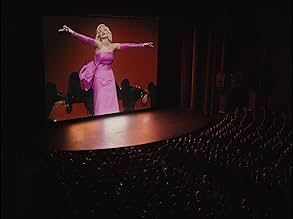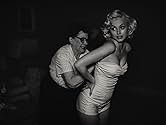The story of American actress Marilyn Monroe, covering her love and professional lives.The story of American actress Marilyn Monroe, covering her love and professional lives.The story of American actress Marilyn Monroe, covering her love and professional lives.
- Nominated for 1 Oscar
- 12 wins & 37 nominations total
- Director
- Writers
- All cast & crew
- Production, box office & more at IMDbPro
Featured review
"I am not an orphan." Marilyn Monroe (Ana de Armas)
The iconic blonde bombshell is an orphan throughout this unnerving, distancing, disturbing biopic of Marilyn Monroe.
In fact, Blonde is an unremittingly, unhappy imaginative take on the elusive Hollywood superstar who became a template for achieving fame and losing identity. As I remember Renee Zellweger playing Judy Garland, I am reminded how intensely Hollywood depicts its neurotic superstars. Joyce Carol Oates's 2000 free-wheeling study of Marilyn helped writer/director Andrew Dominik fantasize as well.
Blonde is a study in black of the lurid and horrid parts of Marilyn's life, circumscribed by her three romances with the controlling men who themselves seemed lost in their parents' legacy: Hollywood scions Charles Chaplin Jr. (Xavier Samuel) and Edward G. Robinson Jr. (Evan Williams); an abusive Joe DiMaggio (Bobby Cannavale); and an odd marriage to Arthur Miller (Adrien Brody). No one appears to acknowledge her wit and smarts-mostly just her body and elusive allure.
Not one relationship ends right, excepting briefly Miller's; no one takes into account the intelligence under that physically-remarkable woman. The film even voices over her estranged father (Tyghe Runyan), who is never close when he promises to be. Of all the abusers, "Daddy" is constantly on her mind as she hopes for his return. Her mother, Gladys (Julianne Nicholson), descending into madness, is more a horror than a love. Marilyn says about her deadly fragmented life: "It's like a jigsaw puzzle, but you're not the one to put it together."
In one delicate scene, she converses with Miller about the similarity between a Chekov character and Miller's, Miller is astonished at the insight and imputes it to someone else. The audience becomes aware of her hidden depth.
But that intellectual side is constantly hidden by Marilyn's sexual persona, dramatically caught in another beautifully filmed moment when her dress flares over the grate in The Seven Year Itch. This display of her butt provokes DiMaggio's abuse and our prurience, neither in her favor. Dominik himself has exploited Norma Jeane, for there must have been more than sex to that vulnerable star. What he does capture well is her need for love and acceptance, denied her in her short life.
Throughout Dominik uses digital wizardry and unique angles, such as when her raucous threesome bed changes into Niagara Falls, niftily connecting her life with her film, Niagara. At other times he shifts between color and black and white and varies aspect ratios, I suppose, to connect her career with her life because of the many kinds of films she made-think Some Like It Hot, The Misfits, and Gentlemen Prefer Blondes for the range of her film experiences.
The lovely lost soul herself, so heavily handled in the persistent flashbacks of her abusive mother and disengaged father, best expresses the split persona that leads her to an early death:
"Marilyn doesn't exist. When I come out of my dressing room, I'm Norma Jeane. I'm still her when the camera is rolling. Marilyn Monroe only exists on the screen." Norma Jeane
It's the real Norma Jeane who should be the subject of Blonde, with speculation about her mind and talents, not just her body. Dominik has caught her charisma but missed her soul.
On Netflix.
The iconic blonde bombshell is an orphan throughout this unnerving, distancing, disturbing biopic of Marilyn Monroe.
In fact, Blonde is an unremittingly, unhappy imaginative take on the elusive Hollywood superstar who became a template for achieving fame and losing identity. As I remember Renee Zellweger playing Judy Garland, I am reminded how intensely Hollywood depicts its neurotic superstars. Joyce Carol Oates's 2000 free-wheeling study of Marilyn helped writer/director Andrew Dominik fantasize as well.
Blonde is a study in black of the lurid and horrid parts of Marilyn's life, circumscribed by her three romances with the controlling men who themselves seemed lost in their parents' legacy: Hollywood scions Charles Chaplin Jr. (Xavier Samuel) and Edward G. Robinson Jr. (Evan Williams); an abusive Joe DiMaggio (Bobby Cannavale); and an odd marriage to Arthur Miller (Adrien Brody). No one appears to acknowledge her wit and smarts-mostly just her body and elusive allure.
Not one relationship ends right, excepting briefly Miller's; no one takes into account the intelligence under that physically-remarkable woman. The film even voices over her estranged father (Tyghe Runyan), who is never close when he promises to be. Of all the abusers, "Daddy" is constantly on her mind as she hopes for his return. Her mother, Gladys (Julianne Nicholson), descending into madness, is more a horror than a love. Marilyn says about her deadly fragmented life: "It's like a jigsaw puzzle, but you're not the one to put it together."
In one delicate scene, she converses with Miller about the similarity between a Chekov character and Miller's, Miller is astonished at the insight and imputes it to someone else. The audience becomes aware of her hidden depth.
But that intellectual side is constantly hidden by Marilyn's sexual persona, dramatically caught in another beautifully filmed moment when her dress flares over the grate in The Seven Year Itch. This display of her butt provokes DiMaggio's abuse and our prurience, neither in her favor. Dominik himself has exploited Norma Jeane, for there must have been more than sex to that vulnerable star. What he does capture well is her need for love and acceptance, denied her in her short life.
Throughout Dominik uses digital wizardry and unique angles, such as when her raucous threesome bed changes into Niagara Falls, niftily connecting her life with her film, Niagara. At other times he shifts between color and black and white and varies aspect ratios, I suppose, to connect her career with her life because of the many kinds of films she made-think Some Like It Hot, The Misfits, and Gentlemen Prefer Blondes for the range of her film experiences.
The lovely lost soul herself, so heavily handled in the persistent flashbacks of her abusive mother and disengaged father, best expresses the split persona that leads her to an early death:
"Marilyn doesn't exist. When I come out of my dressing room, I'm Norma Jeane. I'm still her when the camera is rolling. Marilyn Monroe only exists on the screen." Norma Jeane
It's the real Norma Jeane who should be the subject of Blonde, with speculation about her mind and talents, not just her body. Dominik has caught her charisma but missed her soul.
On Netflix.
- JohnDeSando
- Sep 28, 2022
- Permalink
Storyline
Did you know
- TriviaThis film is based on the 2000 novel "Blonde" by Joyce Carol Oates, which is a fictionalized account inspired by the life of Marilyn Monroe, not an actual biography. Oates insisted that the novel is a work of fiction that should not be regarded as a biography. Oates said that she didn't have anything to do with the making of this film, though once in a while, director Andrew Dominik would get in contact with her, and that she was given an almost-final cut in 2020 and she has praised the film ever since. The novel had been previously adapted into a two-part miniseries: Blonde (2001), starring Poppy Montgomery as Monroe.
- GoofsMarilyn greets the Secret Service agents at her door with: "You were expecting maybe Mother Teresa?" Mother Teresa had not gained international recognition in 1962. It's highly doubtful Marilyn would have known who she was.
- Quotes
Norma Jeane: Marilyn doesn't exist. When I come out of my dressing room, I'm Norma Jeane. I'm still her when the camera is rolling. Marilyn Monroe only exists on the screen.
- ConnectionsFeatured in How Fight Scene Props Are Made for Movies & TV (2022)
- SoundtracksEv'ry Baby Needs a Da-Da-Daddy
Written by Lester Lee and Allan Roberts
- How long is Blonde?Powered by Alexa
Details
- Release date
- Country of origin
- Official site
- Languages
- Also known as
- Rubia
- Filming locations
- Los Angeles Theatre - 615 S. Broadway, Downtown, Los Angeles, California, USA("Gentlemen Prefer Blondes" premiere)
- Production company
- See more company credits at IMDbPro
Box office
- Budget
- $22,000,000 (estimated)
- Runtime2 hours 47 minutes
- Color
- Sound mix
- Aspect ratio
- 1.33 : 1
- 2.39 : 1
Contribute to this page
Suggest an edit or add missing content










































